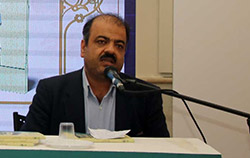The Lack of Attention to the Types of Utilization in Oral History
Akram Dashtban
Fazel Shirzad
2018-7-31
The following text is created based on this question and this field:" What are the pattern of work in the oral history for the rest? Why are these books pattern and what are their characteristics?
Abolfazl Hassanabadi, the director of documents and press unit of Astan Quds Razavi’s[1] Library, said:" The book" Oral History Guide" by Donald Rich can be just named here. Some books, published in the field of oral history, only have the name of oral history but they are not used in their original form.

Referring to a book written in the field of oral history, he added: "The book "Oral History in Iran" is one I have written in this field, in which I have tried to present a definition of oral history based on world standards and paid partly attention on its situation in Iran. Of course, along with the two series articles, I have written about "Interview in Oral History" and "Methodology and Subjects in Urban Studies" that can help the readers in this field.
Hassanabadi went on to say:" Dr. Morteza Nouraee has also written a book entitled "Oral History and Its Place in Iran's Contemporary Historiography in 1358-1385[2]" and said that oral history is an audio or video interview on a topic. Mr. Tatari has also published a book titled "Compilation in Oral History," which was the result of a series of articles on the subject of Oral History. Hassanabadi added:" in the year 1370(1991), Mrs. Bam published a book entitled "Transcription and Editing in Oral History," which somewhat defined a framework, but it should be noted that oral history has a structure and a fluid, diverse nature, and it can't be put in one framework. The standard principles of it should be regarded in order to have an oral history format."
Hasanabadi continued: "Oral history has a separate structure in each of its formats and may have a challengeable structure, or they are different from each other in terms of subject and narration, but there are in common principles on which the title of oral history takes place. Here, we have to categorize the frameworks and model them, and book's approach should be taken into account in compiling the book, which is, as a sample of the book, a literary approach, or a combination of story and reality, or like Mr. Mohsen Kazemi's books, has a particular approach and cannot be considered as an arbitrary one."
He explained standard principles in oral history: "The purposefulness of an interview, audio or video, the presence of the interviewee and interviewer is standard principles in oral history. We may meet standards in the initial production of oral history, but we are so different about using it that there are various types of oral history in the world. Regarding the use of oral history in Iran, of course, we are dropped behind and generally know it only belong in published books."
[1] It is a charitable foundation, in Mashhad, Iran. It is the administrative organization which manages the Imam Reza shrine and various institutions which belong to the organization.
[2] 2006-1979
Number of Visits: 4743








The latest
- Oral History News of December-January 2026
- Analyzing the Impact of Sacred Defense Memories on the New Generation: Usage in Transmitting Values
- The Sha‘baniyya Uprising as Narrated by Ali Tahiri
- 100 Questions/16
- Third Regiment: Memoirs of an Iraqi Prisoner of War Doctor – 16
- 100 Questions/15
- Comparison of Official (Institutional) Oral History with Unofficial (Popular/Personal) Oral History
- The Three Hundred and Seventy-Third Night of Remembrance – Part One
Most visited
- Comparison of Official (Institutional) Oral History with Unofficial (Popular/Personal) Oral History
- The Three Hundred and Seventy-Third Night of Remembrance – Part One
- Third Regiment: Memoirs of an Iraqi Prisoner of War Doctor – 15
- 100 Questions/15
- Third Regiment: Memoirs of an Iraqi Prisoner of War Doctor – 16
- The Sha‘baniyya Uprising as Narrated by Ali Tahiri
- 100 Questions/16
- Analyzing the Impact of Sacred Defense Memories on the New Generation: Usage in Transmitting Values
Oral History of 40 Years
One of the main hypotheses regarding the reason for the growth and expansion of oral history in the modern era relates to the fact that oral history is the best tool for addressing lesser-known topics of contemporary history. Topics that, particularly because little information is available about them, have received less attention.Omissions in the Editing of Oral History
After the completion of interview sessions, the original recordings are archived, the interviews are transcribed, proofread, and re-listened to. If the material possesses the qualities required for publication in the form of an article or a book, the editing process must begin. In general, understanding a verbatim transcription of an interview is often not straightforward and requires editing so that it may be transformed into a fluent, well-documented text that is easy to comprehend.100 Questions/8
We asked several researchers and activists in the field of oral history to express their views on oral history questions. The names of each participant are listed at the beginning of their answers, and the text of all answers will be published on this portal by the end of the week. The goal of this project is to open new doors to an issue and promote scientific discussions in the field of oral history.The Role of Objects in Oral Narrative
Philosophers refer to anything that exists—or possesses the potential to exist—as an object. This concept may manifest in material forms, abstract notions, and even human emotions and lived experiences. In other words, an object encompasses a vast spectrum of beings and phenomena, each endowed with particular attributes and characteristics, and apprehensible in diverse modalities.

